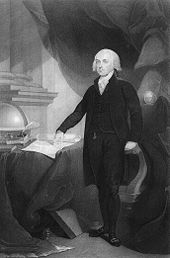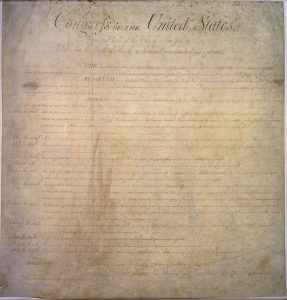“THE BATTLE FOR LIBERTY AGAINST TYRANNY”
by Michael Gaddy, ©2016, blogging at The Rebel Madman
 (Dec. 7, 2016) — “It is a sound and important principle that the representative ought to be acquainted with the interests and circumstances of his constituents.” James Madison, ~ Federalist #56
(Dec. 7, 2016) — “It is a sound and important principle that the representative ought to be acquainted with the interests and circumstances of his constituents.” James Madison, ~ Federalist #56
Article I, Section 2 of our Constitution states in part, “The number of representatives shall not exceed one in every thirty thousand.” This number had been originally set at one representative for every 40,000 population in the Constitutional Convention of 1787, but at the recommendation of George Washington, the number was lowered to the numbers presently in Article I, Section II. Washington stated that one representative for every 40,000 citizens was too large to “secure the rights and interests of the people.”
During the various state ratification conventions, the Anti-Federalists voiced their concerns that the number of representatives per constituent would not rise as the population increased and it would be impossible for a single representative to adequately represent an ever-increasing population, to which James Madison responded, “The number of representatives will be augmented from time to time in the manner provided by the constitution.” And so it was until 1910.
In 1910, the Congress reapportioned the House of Representatives from 393 members to 435, the same number we have today. Since 1910, the Congress has repeatedly violated the provisions of the Constitution by not reapportioning the number of members in the House according to the census. Consequently, today, each member of the House of Representatives supposedly knows and understands the “rights and interests” of all of his/her 741,981 constituents.
Obviously, those in Congress way back then understood if the number of representatives increased according to the Constitution, their individual power would become diluted and the campaign donations and special interest bribes would have to be split more ways. Is there anyone outside of the government cabal who believes any one person can truly represent the rights and interests of 742,000 people? Our founders certainly didn’t think so!
Campaign costs have risen dramatically over the past few decades. In 2016, Colorado Representative Mike Coffman spent over 3 and 1/4 million dollars to be reelected to a job for two years that pays $175,000 per annum. Whose “rights and interests” will be supported by this member of Congress: the special interests who contributed the majority of that $3.25 million, many of whom do not live in this man’s district or even the state of Colorado, or the common citizen who is fighting to keep his head above water in this economy? No- brainer, huh?
The price of admission into the political matrix is much too high for any ordinary citizen to contemplate. Therefore, the “rights and interests” of the common citizen which so concerned George Washington in 1787 are of little-to-no value to our current congressional membership, or by default, the voters who continue to elect them.
While the question would be: how could we ever afford to pay 10,000 members of the House of Representatives? My answer would be: convert them into citizen-politicians with strict term limits and drastically reduce their pay and the ability to play to special interests. What about more representatives for the people and less welfare and warfare? After all, it is in the Constitution.
With all of the new technology today, why should our representatives have to move to the District of Criminals? Would not representation be much better if the representative actually lived among those they are tasked with representing? If we scattered the covey, would it not make it harder for the lobbyists to wine and dine them all?
 A possibility could be: rather than increase the number of members of the House of Representatives to absurd numbers, we could allow the states to resume some of the expressly delegated powers that have been seized by the federal government and bring us back in accord with our 9th and 10th Amendments.
A possibility could be: rather than increase the number of members of the House of Representatives to absurd numbers, we could allow the states to resume some of the expressly delegated powers that have been seized by the federal government and bring us back in accord with our 9th and 10th Amendments.
Now, about those term limits. Let us venture back a moment to those Articles of Confederation, specifically Article V.
“For the most convenient management of the general interests of the United States, delegates shall be annually appointed in such manner as the legislatures of each State shall direct, to meet in Congress on the first Monday in November, in every year, with a power reserved to each State to recall its delegates, or any of them, at any time within the year, and to send others in their stead for the remainder of the year.
No State shall be represented in Congress by less than two, nor more than seven members; and no person shall be capable of being a delegate for more than three years in any term of six years; nor shall any person, being a delegate, be capable of holding any office under the United States, for which he, or another for his benefit, receives any salary, fees or emolument of any kind.”
It is safe to say, especially so for those known as Anti-Federalists, our founders did not in any way support “career politicians.” One-year terms, and no delegate shall serve more than 3 years in any 6-year period is proof positive. I personally doubt you will find any member of Congress today who would agree with Article V of the Articles of Confederation.
Term limits were a part of James Madison’s “Virginia Plan” which was repeatedly voted down in the Convention of 1787, not because of the term limits provision but primarily because of the nationalistic position which would have made the states totally subservient to the central government. As a stand-alone provision, term limits were rejected at the Philadelphia Convention “as entering too much into detail for general propositions.” As in many other aspects of our Constitution and Bill of Rights, the loss of states’ rights and the idea of a strong central government has been established by usurpation and tyranny.
Several of our founders, especially the Anti-Federalists, were very much in favor of term limits for those in government; some even insisted. A former officer in the Revolutionary Army responded to James Wilson of Pennsylvania, a federalist/nationalist, concerning term-limits, or “Rotation,” as it was referred to during our founding era, “Rotation, that noble prerogative of liberty, is entirely excluded from the new system of government, and great men may and probably will be continued in office during their lives.” Another Patriot stated, “There is no provision for a rotation, nor anything to prevent the perpetuity of office in the same hands for life. which by a little well-timed bribery will probably be done to the exclusion of men of the best abilities from their share of offices in the government.
Melancton Smith, a staunch Anti-Federalist who wrote under the nom de plume of the Federal Farmer, stated that rotation/term limits “have a tendency to diffuse a more general spirit of emulation and to bring forward into office the genius and abilities of the continent.” Smith also stated, “A numerous body of enlightened citizens stood ready to serve, if the Constitution, through rotation would limit the power of the rich and influential.”
Thomas Jefferson was most upset that no provision for rotation/term-limits was included in the Constitution, believing that after a Bill of Rights, rotation was the most important item that should have been included. In a letter to James Madison, Jefferson stated the Constitution, “abandoned in every instance the necessity of rotation in office.”
The rightful concerns of the Anti-Federalists were exemplified in the passage of the 22nd Amendment.
Candidates/incumbents for reelection to the US Congress will state overwhelmingly the need for “experience and seniority” and declare forever the wisdom of re-electing them over and over. Considering the current state of the economy and social unrest in this country, one might want to ask themselves “experience and seniority” at what: stealing, plundering and making themselves and their political cronies rich? at giving away their constitutional powers and duties to the Executive branch? at spending other people’s money?
 Career politicians are anathema to Liberty and Freedom. But, we must all remember, we can’t depend on someone else to “drain the swamp” for us. We must do that ourselves. Voting every set number of years for a new master does not remove one from the perils of slavery, to paraphrase Lysander Spooner.
Career politicians are anathema to Liberty and Freedom. But, we must all remember, we can’t depend on someone else to “drain the swamp” for us. We must do that ourselves. Voting every set number of years for a new master does not remove one from the perils of slavery, to paraphrase Lysander Spooner.
The overwhelming brilliance and knowledge of history led those known as the Anti-Federalists to strongly oppose several provisions of our government that have made them appear psychic to many students of the founding era. The things they warned of and the things they wanted included in our Constitution, which were not, have proved to be very prophetic.
It would be most productive if all American citizens would take the time to read and understand this group of American founders. Then, instead of listening to campaign lie after campaign lie and placing a vote based on hope or political party affiliation, we quite possibly could see real progress in the battle for Liberty against tyranny. BUT,——-I’m not holding my breath. Asking most Americans to both think and read seems an effort in futility.
IN RIGHTFUL REBEL LIBERTY
- Much of the information listed in this article can be found in “The Crossroads for Liberty: Recovering the Anti-Federalist values of America’s first Constitution” by William J. Watkins Jr.

